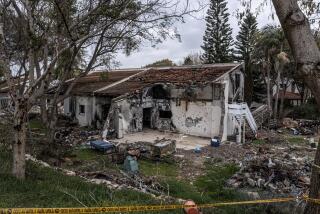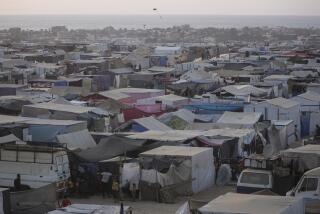Israel Set to Halt Ship, Rabin Says : Government Ready to Use ‘Whatever Means’ Necessary
- Share via
JERUSALEM — Israeli Defense Minister Yitzhak Rabin, speaking shortly after an explosion damaged a ship chartered in Cyprus by the Palestine Liberation Organization for a symbolic voyage to Israel, said Monday that the Israeli government had decided to stop the ship from sailing by “whatever means” were necessary.
Rabin, however, stopped short of confirming speculation that Israel was responsible for disabling the 6,151-ton Sol Phryne, which was holed by an explosion early Monday in the Cypriot port of Limassol as it was being readied to take 130 Palestinian exiles and many more reporters and visiting dignitaries on an Exodus-style voyage to the Israeli port of Haifa.
Other Israeli officials refused to comment, but one source, noting that Israel had been determined to thwart the PLO’s plans, said, “No one is too unhappy about it here.”
The explosion came less than a day after three PLO officials said to have arranged for the Sol Phryne’s charter were killed in a car bombing in Limassol. The PLO accused Israel of being responsible for both attacks.
“We have no comment whatsoever about the whole affair,” an Israeli Foreign Ministry official said.
“Obviously, the PLO’s aims did not coincide with ours, but I don’t want to go beyond that,” the official added. “What happened in Cyprus happened.”
There were reports that the militant Jewish Defense League might be behind the bombing of the Sol Phryne--with which the PLO planned to imitate the voyage of the ship in which Jewish refugees from Nazi concentration camps tried to emigrate to Palestine in 1947, only to be turned back by the British at Haifa. In Israel, however, several security experts said they tended to discount JDL involvement because of what appeared to be the professional nature of the underwater blast.
Keep It From Sailing
In recent days, senior Israeli officials have repeatedly emphasized their determination to keep the PLO ship from sailing, and speculation that Israel was behind the blast was further encouraged by their refusal to deny responsibility for it.
The strongest suggestion that this might be the case came from Rabin, who said that Israel had decided to stop the PLO from making political gains out of a “distorted” comparison with Israeli history.
“The state of Israel decided it was compelled not to let them (the PLO) achieve their purpose, and we will do that by whatever means we find,” Rabin said in a speech delivered in Tel Aviv several hours after the Limassol blast.
The Israeli government’s determination not to let the ship set sail reflects both a desire to deprive the PLO of the publicity being generated by what one official called a “giant propaganda stunt,” as well as a deeper sense of indignation that Jewish history is being mocked by the obvious parallels to the voyage of the Exodus.
Hope and Defiance
However, as the Israeli army struggles to try to suppress more than two months of widespread Palestinian unrest in the occupied West Bank and Gaza Strip, there is also a more practical consideration. For many of the 1.4 million Arabs living in the occupied territories, the attempt to set sail in “the ship of return” is a gesture of both hope and defiance that is likely to further inflame Palestinian passions here. Realizing this, Israeli officials are eager to nip this hope in the bud.
Scattered violence continued on the West Bank and Gaza on Monday, and hospital officials said that a 28-year-old Palestinian man was shot and seriously wounded by soldiers breaking up a demonstration in the Shuafat refugee camp in northern Jerusalem.
Palestinian sources added that a 62-year-old man, Mohammed Rai, died on Sunday of injuries he sustained after having been beaten by Israeli troops. An army spokesman said officials were investigating the report. If confirmed, it would raise the number of Palestinians killed in more than nine weeks of clashes to at least 55.
‘Power and Beatings’
Hundreds more have been injured, many in severe beatings meted out by troops employing what Rabin has described as a mixture of “force, power and beatings” to quell the demonstrations. The controversial policy was officially introduced last month in an effort to lower the death toll by using an alternative to live ammunition. However, since then there have been numerous instances in which Israeli soldiers have been accused of using excessive force.
While the army continues to insist that such cases are the exception to the rule, the military commander of the West Bank, Maj. Gen. Amram Mitzna, on Monday confirmed one particularly gruesome case in which soldiers buried four Palestinians alive in the West Bank village of Salim, 30 miles north of Jerusalem.
“In my worst dreams, I could never imagine that soldiers would do what was done,” Mitzna told Israel Army Radio.
Two soldiers have already been arrested in connection with the incident, and an army official said more arrests were likely. “The investigation has been given the highest priority,” the official said.
Bulldozer Summoned
The incident occurred Feb. 5 when, according to accounts in the Israeli press, an officer identified only as “Charlie” ordered the driver of a bulldozer to run over the four youths, who had been beaten in the apparent belief that they threw stones during a demonstration in the village. The driver refused to run over them, but he did obey orders to dump a load of dirt on the prone and disabled youths, according to the testimony of eyewitnesses. The youths were rescued by villagers, who dug them out from beneath about 18 inches of dirt after the soldiers left.
An officer identified as “Charlie” also was implicated in an incident in the West Bank village of Beita last Thursday, when soldiers searching for a man suspected of having set fire to a bus broke into homes and beat a number of people, including a 75-year-old man, who suffered a broken hand and several cracked ribs. According to witnesses, the soldiers in that incident were commanded by an officer who identified himself as “Captain Charlie.”
While Palestinian sources say they hope to keep up the rebellion for “at least two or three more months,” the level of violence has abated over the last several days due to what some concede have been recent Israeli successes in arresting many of the leaders of the “Unified National Leadership for the Uprising in the Occupied Territories,” a coalition of PLO and pro-PLO groups that seems to be providing the organization for many of the protests.
More to Read
Sign up for Essential California
The most important California stories and recommendations in your inbox every morning.
You may occasionally receive promotional content from the Los Angeles Times.












